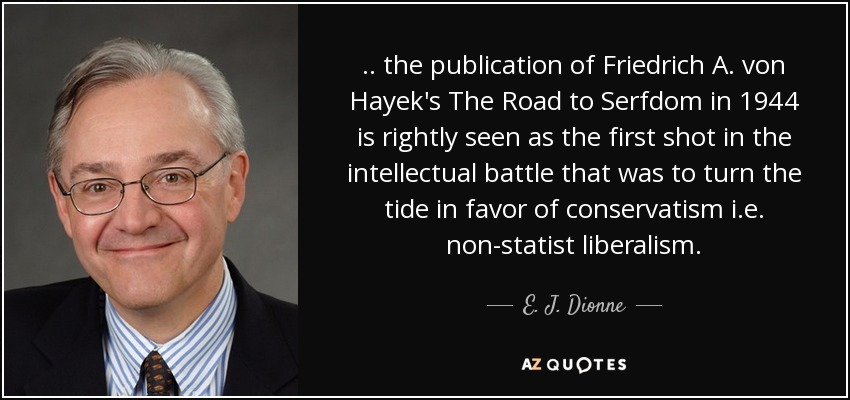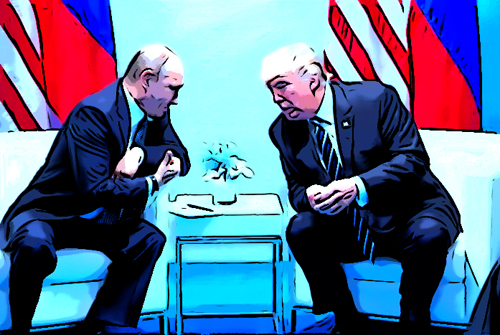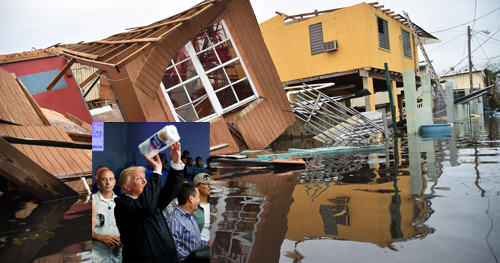Friedrich Hayek was, of course, the author of the book The Road to Serfdom, first published in 1944, which was enormously influential in the last half of the 20th century. Hayek’s basic arguments would become a cornerstone of movement conservatism and libertarianism.

For those who don’t remember: Hayek was certain that the ultimate evil that would destroy democracy and individual liberty is central planning of the economy. Free markets equal free people. The key to maintaining individual liberty is to support the free exercise of capitalism and markets. Conversely, it was self-evident to conservatives that capitalism and tyranny cannot co-exist, and that if (for example) Communist countries would become more capitalist, individual liberty for their citizens would follow closely behind.
These days, of course, a lot of serious thinkers are asking if capitalism and democracy can co-exist, but let’s put that aside for now. Eric Levitz at New York magazine points out that Trump is assuming the role of Central Economic Planner, and the Right seems to not be objecting.
On Friday, President Trump formally endorsed a plan to keep struggling coal power plants open — by forcing energy-grid operators to purchase power from them at uncompetitive rates — for the sake of “national security.”
This proposal is bonkers for a variety of reasons. The notion that it is in America’s national-security interest to prop up the coal industry is patently absurd. Our nation’s power grid has plenty of alternative sources of reliable energy — and keeping coal plants in business exacerbates climate change, which is itself a major national-security threat (if you believe those tree huggers at the Pentagon, anyway). Further, the costs of subsidizing inefficient, dirty energy will fall partially on consumers in the form of higher electricity bills. Which is to say: The administration has found a way to combine the (supposed) short-term economic costs of environmental protection with the long-term ecological risks of laissez-faire.
Where is the principled outraged from conservative intelligensia? Oh, wait … is there a conservative intelligensia any more?
The libertarian crew at Reason magazine do object (mildly) to Trump’s tariffs, but they haven’t gotten around to the coal power plan yet. I checked at National Review — nope, although their site search engine isn’t working so I couldn’t look past the front page. I checked at the American Conservative, which does occasionally make sense and seems to be the last refuge of conservatives who haven’t utterly sold out. Nothing. Maybe they need more time.
You know that if Hillary Clinton or Barack Obama had proposed the coal power plan, Republicans would all be screaming about Communism at the top of their lungs and hauling out their dog-eared copies of Hayek to frantically point at relevant paragraphs. But with the Right, the evil of an act does not depend on what is done but who is doing it. Just as white evangelicals threw Jesus and the Gospels under the bus to support Trump, the American Right in general seems ready to turn a blind eye to a blatant violation of Hayek’s principles, for the sake of … what? Their tribe? Or are they all in on the take?
Back to Levitz:
But the craziest aspect of the Energy Department’s proposal isn’t that it puts the profits of coal magnates above the survival of the planet. That much, we have learned to expect. The wild thing about Trump’s plan is that it rests on an interpretation of executive authority that is incredibly dangerous to the conservative movement.
Generally speaking, the president is not supposed to be able to unilaterally direct subsidies at his favorite industries; that’s Congress’s job. But Trump’s attempt to pay back his coal-magnate donors would never survive on Capitol Hill — it is that rare energy policy that is opposed by wind power, solar energy, and oil companies, alike.
There is absolutely no justification for it, except that Trump wants to do it. Somewhere in his developmentally arrested brain he may dimly remember that he promised to save coal miner jobs, and maybe this is his plan to save them. Or else his company is poised to exploit the coal industry somehow. That’s all I can figure.
Thus, the administration has decided to simply deliver the handouts itself — by invoking the Defense Production Act, a Cold War-era law that empowers the president to “effectively nationalize private industry to ensure the U.S. has resources that could be needed amid a war or after a disaster.”
As Bloomberg notes, this authority was most famously exercised by Harry Truman, who used it to cap wages and impose price controls on the steel industry during the Korean War.
The steel thing happened in 1952, and conservatives at the time threw a fit about it.
If our current president can wield this power to prop up coal plants, it’s hard to see why a future one couldn’t use it to shut them down:
This takes us to Levitz’s argument, that a future president with socialist leanings (the article is illustrated with photos of Bernie Sanders) could use the same presidential authority to shut down fossil fuel industries altogether, because how will America defend itself if its major coastal cities are underwater?
Similarly, one could imagine the Warren-Sanders administration finding a progressive use for the expansive trade powers that Trump has claimed. Creatively abusing another Cold War-era law, Trump has assumed the right to unilaterally impose tariffs on any nation he chooses — so long as he offers a specious national-security justification for doing so. After the next Democratic president uses the Defense Production Act to rapidly reduce America’s carbon emissions, it could threaten massive tariffs on any (developed) foreign nation that refuses to aggressively pursue its own emission-reductions targets — thereby turning America’s coveted consumer market into a force for climate justice.
Levitz says there are arguments that, under existing law, a president could override pharmaceutical patents to provide low-cost drugs to beneficiaries of federal programs. A president might also use executive power to turn post offices into public banks. And perhaps, if the next Democratic president is saddled with an obstructionist Republican Congress, that sort of thing could happen.
But if Trump’s plan for propping up the coal industry isn’t challenged by Republicans in Congress, I think we can officially declare that Hayek is dead. I can’t say I’m sorry, since his arguments were way too simplistic. Unregulated industrial capitalism in the 19th century created Communism, after all. And the young folks today are far more open to socialist ideas than their parents were. If there are still any Republicans who believe Hayek was right, let them speak now or forever hold their peace.
Update: Arghh — the SCOTUS ruled in favor of the homophobic wedding cake baker.



